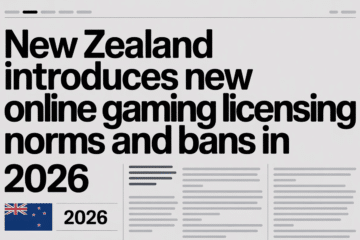What the Digital Entertainment Industry in Auckland is Like in 2025

Last Updated on July 29, 2025
Stand on Karangahape Road at sunrise and you will hear laptops waking up in co‑working lofts, coffee machines rattling, and a dozen languages swapping ideas about game engines, film sets, and virtual concerts. Auckland spent the early part of this decade laying fibre under every major street, so by 2025, it feels almost casual to stream 8GB textures or host a 30-player test match during the lunch hour.
Creative and tech grants from Auckland Unlimited help small studios rent space near the harbour, rather than relocating overseas. High school hackathons fill empty office towers on weekends. When Wētā FX hosts a mentoring night, 15‑year‑olds bring sketches of dragons that breathe volumetric smoke. The city has made experimentation feel safe, and that safety is paying off in original projects that blend culture, code, and sea air.
Games and Online Play Keep Growing
Console and PC games still anchor many living rooms, yet the fastest lift this year comes from browser and mobile titles that update weekly.
Grinding Gear Games added a New Zealand esports circuit for Path of Exile. Black Sands Studio released a puzzle adventure that retells Māori creation stories with motion‑captured kapa haka.
Real money play is also rising, although Kiwi players remain cautious about trust signals. Forum threads praise sites that post clear terms, offer local payment methods, and limit pushy pop‑ups.
One hot talking point is the bonus offers. For example, Ice Casino no deposit bonus, where reviewers highlight the way it hands out welcome credit and free spins to new customers. The free spins are on the hottest pokies in NZ, such as Elvis Frog, Big Bass Bonanza, or Chilli Heat. Additionally, no deposit bonuses allow you to play without financial risk. This is a great way to test the platform, get to know the games
Home‑Grown Streaming Platforms
Subscription fatigue hit wallets in 2024, yet Aucklanders still want shows made for them, not just shipped from Hollywood. Māori Television launched a bilingual on‑demand site that mixes documentaries about language revival with animated shorts.
KiwiFlix bundles classic New Zealand cinema, indie comedies, and new crime dramas for a price that undercuts imported giants. Budgets remain smaller than those in LA, so writers lean into authenticity rather than flashy special effects. The result is a library that looks uniquely local.
A roadside dairy becomes a familiar backdrop, and the Hauraki Gulf appears in drone sweeps more often than Central Park. Viewers respond because these stories feel like their own, and international subscribers log in for the same reason.
Film Magic and Visual Effects Exports
Wētā FX still animates hero shots for space operas, yet new ventures join the export list every quarter. M5 Studios in Mount Roskill specialises in realistic ocean simulations seen in nature documentaries.
Silver Fern Cartoons wins festival awards for short films that mix hand‑drawn frames with digital watercolours. Export revenue from screen and post‑production services hit an estimated 1.3 billion New Zealand dollars this year, roughly 9% higher than in 2024.
Foreign producers cite generous tax rebates, a stable dollar, and a deep crew base that can pull off jungle fog at dawn and futuristic neon at night without flying anyone in.
Augmented Adventures for Visitors
Tourists no longer carry folded pamphlets. Their phones overlay three‑dimensional stories onto shop windows. The City Rail Loop app lets commuters scan murals to unlock animated timelines of the stations they pass.
At night, the Viaduct Harbour Light Trail projects game‑style quests onto building walls, encouraging families to collect digital tokens that trade in for free desserts.
Local game designers license these experiences and earn a cut of every ticket. Restaurants and hotels pay for sponsored clues or custom landmarks.
The city, once worried that mobile screens would lure visitors indoors, now uses augmented storylines to guide them through galleries, parks, and hidden laneways.
Building Skills for Tomorrow
Auckland University of Technology has merged computer science, storytelling, and business courses into a new Interactive Narrative major. Students pitch game concepts, prototype in Unity, and then learn how to secure seed funding without giving up all their intellectual property.

Scholarships earmark seats for Māori, Pasifika, and recent migrant communities, ensuring that tomorrow’s writers and coders match the city’s colourful population.
Capstone projects often turn into commercial releases. One recent graduate team sold a rhythm game to an overseas publisher before graduation day.
Snapshot of Auckland’s Digital Entertainment Sectors in 2025
| Segment | Leading Teams | 2025 Revenue (NZD million) | Growth over 2024 | Key Exports |
| Video Game Development | Grinding Gear Games, Black Sands Studio | 680 | 11% | PC and mobile titles |
| iGaming Platforms | Local and licensed offshore brands | 410 | 14% | Game content, compliance advice |
| Esports Events | Spark Arena, Let’s Play Live, University leagues | 120 | 19% | Broadcast rights, tickets |
| Streaming Media | KiwiFlix, Māori Television Online, TVNZ+ | 545 | 9% | Series and format sales |
| Film and Visual Effects | Wētā FX, M5 Studios | 1,300 | 9% | CGI sequences, animation |
| AR and VR Tourism | City Rail Loop AR, Viaduct Harbour Light Trail | 65 | 21% | App licenses, custom content |
Community Stories in New Formats
Digital entertainment here is more than a night in. It has become a way for local voices to reach the country and the world. Indie developers retell the voyage of the Tainui waka as a side‑scrolling journey. A web series shot on Queen Street pokes gentle fun at Auckland’s endless building cranes while exploring migrant life.
Libraries run monthly VR afternoons where seniors paddle virtual kayaks around the Bay of Islands. Grants from Creative New Zealand prefer projects that include Māori or Pasifika co‑writers, so the digital shelf is filling with scripts that might never have cleared old funding models.
Hurdles that Still Need Solving
Central city rent keeps climbing. Small collectives sometimes move to Avondale or swap offices for cloud servers and weekly café check‑ins. Electricity costs inch upward, which matters for render farms that chew through terabytes nightly.
Talent loss is another worry. Mid‑career developers sometimes leave for bigger salaries in Melbourne or Vancouver. Lobby groups are pushing for housing incentives and faster resident visas to pull specialists back. Early indicators suggest that flexible remote work packages could be a cheaper fix than new office towers.


